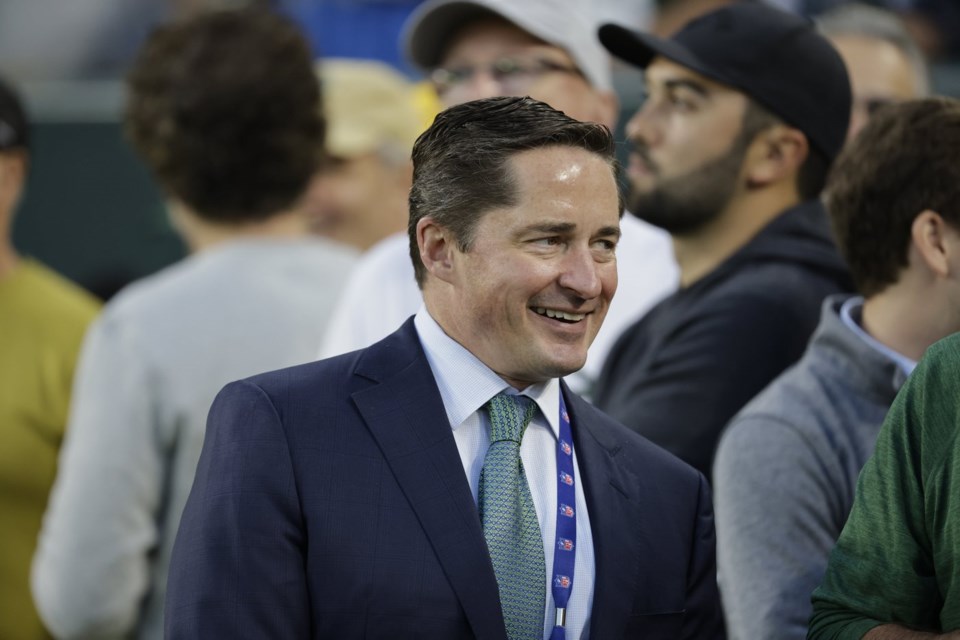GREEN BAY, Wis. (AP) — Ed Policy got a keen understanding about the realities of his dream occupation while growing up in a football family.
Now that he’s about to take over as the president/CEO of the Green Bay Packers, Policy gets to put into practice the lessons he learned as the son of former San Francisco 49ers and Cleveland Browns president Carmen Policy.
“It was an incredible education,” Policy said. “We talked about the NFL and the business of the NFL and pro football every night at the dinner table.”
Policy experienced the joy of Super Bowl championships and the adversity that came when his father made difficult decisions such as trading Hall of Fame quarterback Joe Montana. The training continued as Policy spent the past 13 years in Green Bay while the Packers continued succeeding after the 2023 trade of four-time MVP quarterback Aaron Rodgers.
Now it’s his turn to make the tough calls.
Policy, 54, assumes his new role July 25 when the Packers hold their annual shareholders meeting. He was recommended by a search committee and unanimously selected by the Packers’ board of directors to take over for Mark Murphy, who reaches the mandatory retirement age of 70 next month. Murphy had held this position since 2008.
Don’t expect this transition to result in major changes.
“We both approach the importance of this job and especially the stewardship nature of this job — we take that very importantly — so I think you’ll see a lot more similarities than differences,” Policy said. “Obviously we’re slightly different generations, different communication styles. We’re different people. But I don’t think there are going to be any real glaring differences.”
Policy, a former Arena Football League commissioner, president and CEO, joined the Packers as vice president and general counsel in August 2012 and was promoted to chief operating officer in January 2018.
In Policy’s new role, Packers coach Matt LaFleur, general manager Brian Gutekunst and executive vice president/director of football operations Russ Ball will report to him. Policy says all three of them have multiple years left in their contracts, though he wouldn’t specify beyond that.
Policy said there are no plans to extend those contracts before this season, but he praised LaFleur, Gutekunst and Ball as “three exceptional people doing an exceptional job right now and working well together.”
Policy was part of the panel that hired Gutekunst and LaFleur. He has a longer relationship with Ball through their Arena Football backgrounds.
Although he wants more meetings among top Packers officials to foster better communication, Policy said he has no plans to meddle.
“I would communicate very frequently and openly and directly with them on all things, but certainly no team needs two head coaches or two GMs,” Policy said.
This is the type of opportunity Policy always wanted. Policy said he started thinking about a career in football as far back as high school.
“I had two dream jobs in mind,” Policy said. “Running a team or commissioner of the league were the two.”
Policy remembers riding in a passenger’s seat and listening to his dad negotiate Hall of Fame quarterback Steve Young’s contract on a car phone. He also recalls the hate mail his father received after making controversial decisions.
“I think my dad just always had thick skin,” Policy said. “And I think I inherited that, so I’m grateful for that.”
Policy says he still calls his dad a couple of times a week and often seeks his advice.
But he also realizes his new job has its own set of challenges based on the Packers’ unique ownership structure.
He expects his years working alongside Murphy to help in that regard, because it taught him how to become more collaborative. Policy calls Murphy “probably the strongest consensus-building leader I’ve met.”
“In my opinion, every NFL team is a community asset, and every president is a steward of that assets,” Policy said. “Here, it’s literal. I think it’s more figurative everywhere else. Here it’s literal, and it’s more important.”
Policy said the Packers’ status as a publicly owned franchise provides advantages and disadvantages.
The benefit is that the Packers can invest any money they make right back into their team, and there are no worries about family squabbles interfering with anything. But he also noted that other teams can bring in limited partners and make revenue way beyond anything the Packers gain through their occasional stock sales.
“From an organizational and operational standpoint, it’s a competitive advantage,” Policy said. “From a raising capital standpoint, it’s probably not an advantage.”
That requires the Packers to make smart decisions in order to remain competitive. Policy looks forward to that challenge, while continuing to utilize the guidance he received from his dad at the dinner table.
“To this day, I will tell you I rely on the lessons I’ve learned from him,” Policy said.
___
AP NFL: https://apnews.com/hub/nfl
Steve Megargee, The Associated Press


